With pressure mounting on the airline industry to play its part in combating greenhouse gas emissions, European manufacturer Airbus today announced plans for three emissions-free aircraft. The Toulouse-based planemaker said the models could enter commercial service by 2035.
“This is a historic moment for the commercial aviation sector as a whole and we intend to play a leading role in the most important transition this industry has ever seen,” said Airbus CEO Guillaume Faury. “The concepts we unveil today offer the world a glimpse of our ambition to drive a bold vision for the future of zero-emission flight. I strongly believe that the use of hydrogen – both in synthetic fuels and as a primary power source for commercial aircraft – has the potential to significantly reduce aviation's climate impact.”
Best of three
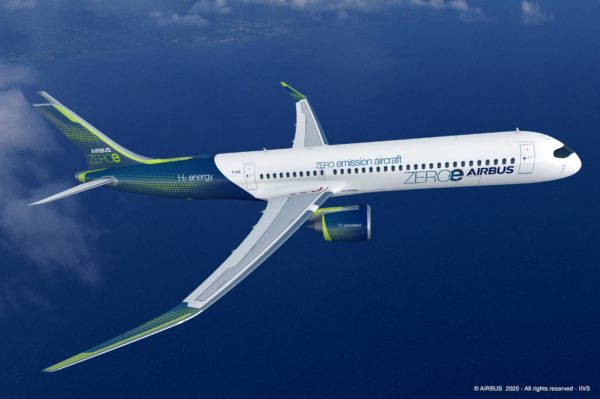 The first of the three concept aircraft revealed features a turbofan design and could transport 120-200 passengers and travel more than 3,700km, the manufacturer claimed. The engines would be modified gas-turbines that could run on hydrogen rather than conventional jet fuel. The hydrogen would release its stored energy through combustion, rather than reacting in a fuel cell.
The first of the three concept aircraft revealed features a turbofan design and could transport 120-200 passengers and travel more than 3,700km, the manufacturer claimed. The engines would be modified gas-turbines that could run on hydrogen rather than conventional jet fuel. The hydrogen would release its stored energy through combustion, rather than reacting in a fuel cell.
The aircraft, which appears similar to ordinary commercial planes, would also feature an embedded electric motor powered by hydrogen fuel cells, for use when extra power is necessary, according to the company presentation.
A second, fairly ordinary looking airplane concept revealed by Airbus has a turboprop design which would feature propeller-based 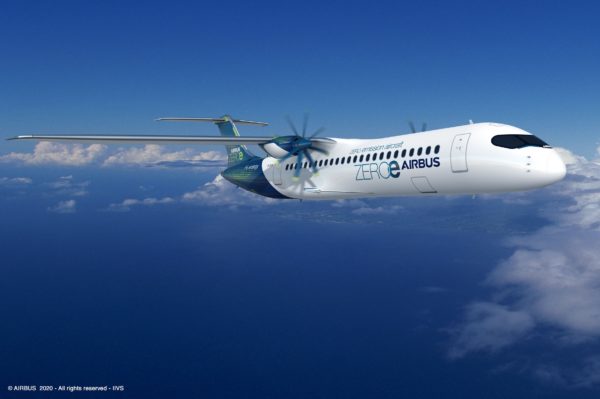 propulsion instead of jet engines. That model could host up to 100 passengers and would also use hydrogen combustion in modified gas turbines to generate energy, with embedded electric motors similar to the design above. The concept could travel almost 2,000km and would be used for short-haul flights, according to Airbus.
propulsion instead of jet engines. That model could host up to 100 passengers and would also use hydrogen combustion in modified gas turbines to generate energy, with embedded electric motors similar to the design above. The concept could travel almost 2,000km and would be used for short-haul flights, according to Airbus.
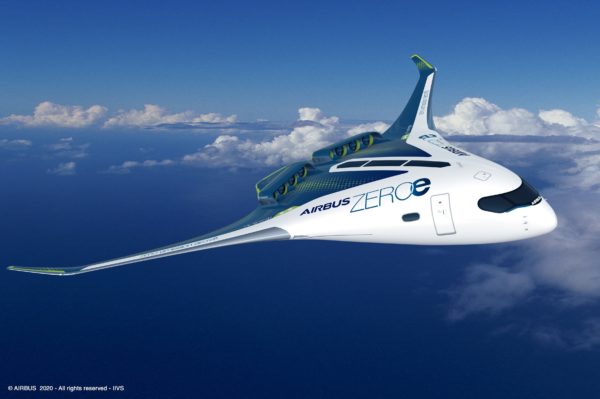
The third model revealed featured a blended-wing design, could carry 200 passengers and would have a range of almost 4,000km, as a relatively large fuselage would accommodate passengers and hydrogen. Here too, the Airbus anticipates using a combination of hydrogen combustion and fuel cell reaction to optimize the power supply.
Grazia Vittadini, chief technology officer at Airbus, said hydrogen has the same energy level as kerosene but just a third of the weight. The “catch,” is the fact hydrogen occupies four times the volume of the conventional fuel, rendering its use in long-haul flights challenging.
Airbus said the hydrogen would be cooled to -253 degrees Celsius, at which point it would become liquid and increase volumetric density. For additional onboard storage capacity, some fuselage space could be devoted to the fuel, rather than passengers. That switch, however, would necessitate a reconfiguration of fuselage length and diameter, with a negative impact on aerodynamic drag. Optimizing that change would be among the challenges facing Airbus over the next 15 years, the company stated.
Popular content
Next year, Airbus expects to launch a hydrogen ground demonstrator, which could take-off in demonstration flights in 2023. Safety verification and validation processes, and the development of hydrogen infrastructure on the plane and at airports, would be a long process. Add in certification with permission to use the designs for commercial aviation and the 15-year timeline begins to appear ambitious.
Why hydrogen?
“Battery technology is not moving at the pace we want,” said Glenn Llewellyn, Airbus VP and head of zero-emission aircraft at today's press conference. “And this is where hydrogen comes in. It's got several thousand times more energy per kilogram than batteries could have today.” Llewellyn added, Airbus has started work with airlines, airports and energy companies because the endeavor will require enormous joint efforts.
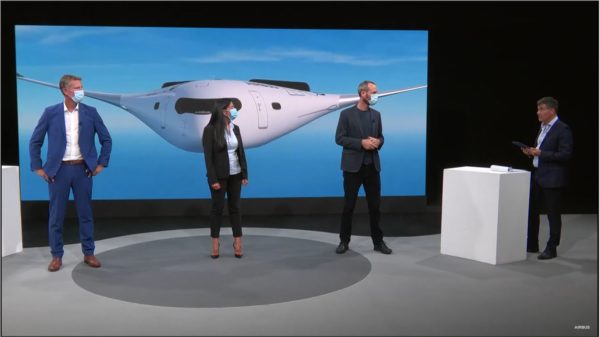
Image: pv magazine snapshot from Airbus' online press conference footage
Before hydrogen-powered aircraft can take to the sky, Airbus noted, airports will require significant hydrogen transportation and refueling infrastructure investments. The EU-based manufacturer said governments should support its objectives by providing funding for research and technology, plus digitalization to manage the projects necessary.
States should also incentivize airlines to switch legacy aircraft to hydrogen-powered models, said Airbus.
Quizzed about strategic partners, CTO Vittadini said: “For sure, the challenge of decarbonizing aviation is such that by no means [is it] something we intend to do on our own. So indeed, we are going to be reinforcing partnerships across the sector, across the industry, considering, of course, research institutes, our customers. We have, of course, already several projects going.”
The three Airbus executives present at today's event were less forthcoming on just how much their hydrogen flight effort would cost, with Llewellyn stating only that the initiative would require “billions.” One of the spin-off benefits that could be anticipated, said the airplane manufacturer, would be a reduction in hydrogen costs beyond the aviation industry.
Consultant McKinsey published an EU-commissioned report in June which estimated hydrogen-powered flight would only add around 10% to short-haul flight ticket costs – around $5-10 – and could be viable in 8-15 years, pending technology breakthroughs, certification and standards and infrastructure. Medium-range hydrogen flights would require a 30-40% rise in ticket prices, saidMcKinsey, as the larger fuselages required to store liquid hydrogen would lead to 25% more in-flight energy consumption. And long-haul passengers would have to pay 40-50% more for hydrogen tech, meaning synthetic fuel, or'synfuel', may offer a more effective path towards decarbonization for that segment of the industry.
This content is protected by copyright and may not be reused. If you want to cooperate with us and would like to reuse some of our content, please contact: editors@pv-magazine.com.
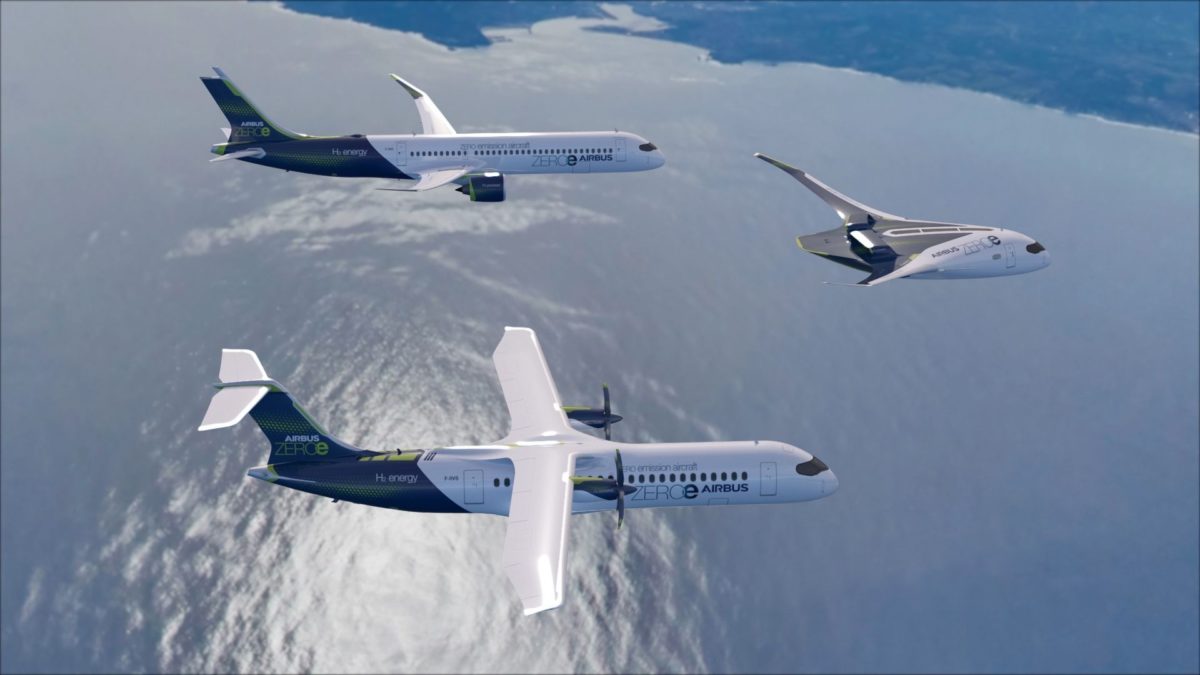


11 comments
By submitting this form you agree to pv magazine using your data for the purposes of publishing your comment.
Your personal data will only be disclosed or otherwise transmitted to third parties for the purposes of spam filtering or if this is necessary for technical maintenance of the website. Any other transfer to third parties will not take place unless this is justified on the basis of applicable data protection regulations or if pv magazine is legally obliged to do so.
You may revoke this consent at any time with effect for the future, in which case your personal data will be deleted immediately. Otherwise, your data will be deleted if pv magazine has processed your request or the purpose of data storage is fulfilled.
Further information on data privacy can be found in our Data Protection Policy.